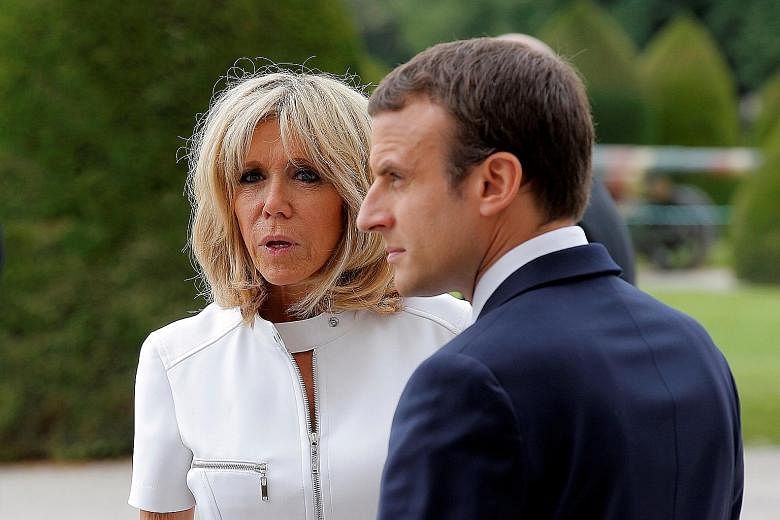French President Emmanuel Macron has hastily withdrawn plans to grant his wife the title of "First Lady" and allocate to her a budget and dedicated civil service support.
Officials in Paris have clarified that although Mrs Brigitte Macron will continue to undertake public engagements, she will not have a formal status or be paid by taxpayers. "The wife of the President does not and will not have any payment for what she does," French government spokesman Christophe Castaner told the media.
The climbdown became inevitable after more than 300,000 enraged citizens signed a petition last week opposing plans for Mrs Macron's new status.
But although this affair has inflicted a considerable personal embarrassment on France's head of state, political observers in many capitals acknowledge that the rights and obligations of top politicians' spouses should be regulated.
Opposition to Mr Macron's plans was so fierce partly because it was so ill-timed. During his recent electoral campaign, Mr Macron benefited from a scandal which plagued Mr Francois Fillon, the chief standard-bearer of the political right in France and once considered virtually certain to become president.
Mr Fillon, a former prime minister, ultimately lost precisely because he got embroiled in a scandal over his wife's allegedly opaque finances.
Suggesting now that Mrs Macron should enjoy formal access to government funds struck many voters as odd from a president who just won power promising to end the old French practice of using spouses as conduits for political financing.

There is also the snag that the partners of France's last two presidents were associated more with scandal and media tittle-tattle rather than good deeds.
Mr Nicolas Sarkozy, who ruled France during the last decade, became the first president both to split from his wife and to remarry while in office.
The wife he divorced played no public role, while Ms Carla Bruni, his new spouse, is known for her looks, past modelling career and sparkling diamonds.
Then, there was Mr Francois Hollande, president until May this year, who arrived at the Elysee Palace with a partner he never married and then switched mid-term to another partner who was never seen in public.
And, as unfair as this may be, Mrs Macron is currently famous for only one thing: She is over two decades older than her 39-year-old husband.
There is also a lack of knowledge about what the position of a top politician's spouse is or should be. Few people in France, for instance, seem to be aware of the fact that, out of a €7 million (S$11.2 million) yearly budget allocated to running the Elysee presidential residence in Paris, roughly a tenth is already spent on the French president's wife on things like her travel and security detail.
Nor, for that matter, do many American voters realise that the title "First Lady" of the United States - now so widely used that it is often abbreviated in official documents to Flotus - has no legal meaning whatsoever, although she does get separate funding from Congress.
And the confusion on such matters is global. When US President Donald Trump recently made references to Mrs Akie Abe's alleged lack of knowledge of the English language, the world's media invariably referred to the wife of the Japanese Prime Minister as a "First Lady".
There is, of course, no such title. And Mrs Abe will not get it even if it existed, for the simple reason that Japan is a monarchy, and its "First Lady" is the Empress.
Mr Macron wanted to eliminate such confusions.
His plan to create the office of France's First Lady was "just an exercise in transparency", explained Mr Castaner.
And there is no question that this is both worthwhile and timely, for in most industrialised countries, spouses are shouldering an increasingly onerous burden. They are required to appear supportive, but not assertive, lest they get accused of being "domineering".
They are expected to do good works (Mrs Macron gets 200 letters a day from French citizens and organisations) and look glamorous at all times without one strand of hair out of place, but without imposing any cost on the taxpayer.
And they are expected to be bright yet without, of course, overshadowing an elected politician. The heavy cost this imposes on professional female spouses - and, increasingly, on men as well, as Mr Philip May, the husband of the British Prime Minister, discovered last year when he had to give up his banking career after his wife became leader - may deter future generations of able people from entering politics altogether.
Regulating the status of politicians' spouses is, therefore, a legitimate matter for debate.
Yet as France's experience shows, it is also a topic which remains toxic with voters.


